Exploring the Concept of Pet Dragons


Intro
Pet dragons may seem like a figment of dreamers' imaginations, but they’ve captured our collective fascination for centuries. Originating from ancient folklore, dragons serve not only as symbols of power and mystery but have also evolved into modern-day interpretations that blend fantasy with a touch of the whimsical. The idea of owning a pet dragon stirs a mix of adventure and responsibility, intertwining deep-seated cultural motifs with psychological significance. As we unravel the implications of such fantastical ownership, we find ourselves questioning the very fabric of human-animal bonds. This article aims to guide enthusiasts through the layers of this complex notion—examining responsibilities, ethical considerations, and the profound connections formed with these mythical creatures.
Avian Care Basics
While dragons are not the same as the birds we know today, who wouldn't indulge their imagination by considering how one might care for a pet dragon, reflecting the care we apply in bird ownership? Understanding the care of our feathered friends can help illuminate our approach to caring for an imaginary scaled companion.
Importance of Proper Nutrition
A well-fed dragon, much like a well-fed bird, could lead to a happier and healthier existence. Drawing parallels, the concept of providing a diverse diet plays a vital role. Instead of crickets or seeds, we might whimsically envision a dragon feasting on roasted meats or enchanted fruits. Yet, the core importance remains the same: a balanced diet fosters good physical health and enhances vitality.
Understanding Bird Species and Their Needs
Each breed of bird exhibits unique traits and preferences, and similarly, our imagined dragons might have varied temperaments and needs. Whether you fancy a sleek wyvern or a robust fire-breathing beast, knowledge of their mythical habits—just like understanding parakeets or cockatoos—can lead to a stronger bond.
Basics of Birds' Habitat Setup
Creating a suitable habitat is paramount in both worlds of birds and dragons. While one might envision a spacious cave adorned with sparkling gems for a dragon, the essence is the same as a pleasurable aviary for birds. A welcoming space encourages exploration and comfort, which any creature—real or imagined—desires.
Grooming and Hygiene Tips
Just as birds require regular grooming for plumage health, so too might a pet dragon need care for its notoriously spiny hide. Keeping the environment clean serves a dual purpose of aesthetic enjoyment and health prevention. Accumulation of dirt could lead our mythical beasts to discomfort, much like how a bird exposed to unhealthy conditions often faces health risks.
Interacting with Your Pet Dragon
Interacting with a dragon, much like engaging with a bird, requires patience and understanding. While one might not hear a dragon chirp, the essence of communication remains essential.
Building Trust and Connection
Establishing trust with any pet, whether it roams your living room or flies within a fantastical realm, is vital. Building a bond can take time, but as with birds, regular and gentle interaction could foster confidence and loyalty in your dragon.
Training Techniques and Tips
Training should be approached with creativity. One could train a dragon to perform tricks similar to avian methods—using treats as rewards. Imagine summoning your dragon with a fiery breath as they soar to your side!
Fun Activities for Dragon Owners and Their Dragons
Engaging with your dragon can be a delight. Activities could range from flying exercises to exploring vast landscapes together. Encouraging play can enhance the pet's physical and mental well-being.
Recognizing Dragon Cues and Behaviors
Although one might not recognize a dragon's cues as they would with a parrot, learning their behavior is just as necessary. Subtle gestures may reveal a dragon's disposition or comfort level.
Emotional Well-Being of Dragons
Next, exploring the emotional health of dragons may sound whimsical, yet is critical in concept. A dragon's emotional state could impact its behavior and relationship with its owner, just like a bird’s mental health influences its sociability.
The Role of Play and Socialization
Socialization plays a key role in a dragon's happiness. Encouraging play is prudent. The importance of interaction and stimulation can’t be overstated—be it at the breakfast table or through midday adventures.
Enhancing Dragons' Emotional Health
Fostering a positive environment that encourages exploration fosters emotional resilience. Finding joy in small moments creates lasting connections and memories.
Assessing Dragon Stress and Remedies
Recognizing stress in your dragon can be challenging, but vital to their well-being. Much like birds can show signs of tension through specific behaviors, understanding your dragon’s signals is equally important.
Building Strong Human-Dragon Bonds
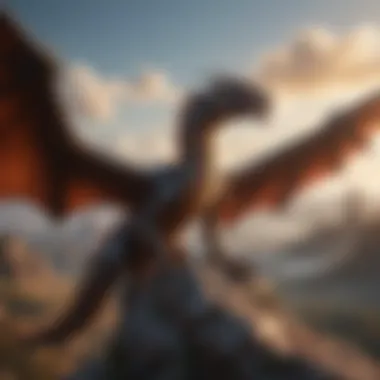

Through consistent love, effort, and understanding, a bond can be cultivated that transcends the mythical realm into something pure and solid, drawing echoes from the companionship of bird to owner.
The End
While creating a comprehensive guide to pet dragons may seem fanciful, the truths underlying care, interaction, and emotional well-being resonate widely. The way pet ownership shapes us is at the heart of this exploration and beckons those enchanted by the concept to ponder deeper about responsibility, relationships, and the wondrous blend of reality and myth.
Preamble to the Concept of Pet Dragons
The allure of pet dragons stirs a rich blend of imagination and wonder in the human spirit. These mythical beings weave through the tapestry of folklore, offering not just tales of ferocity and strength but also companionship in an extraordinary form. In this segment, we peel back the layers surrounding dragons as pets, examining their multifaceted significance, not just as imaginary creatures but as cultural icons.
Understanding the concept of pet dragons is crucial because it opens a door to discussions about mythology, fantasy, and the human penchant for companionship. They embody various traits that resonate with emotional and social dynamics, reflecting desires for loyalty, power, and even adventure—attributes often idealized in both literature and popular culture.
A fascination with pet dragons can inspire creativity, whether through art, literature, or the burgeoning field of virtual pets. As we explore this captivating subject, we uncover benefits such as the stimulation of imagination and the ability to form connections with beings outside the realm of reality. The concept also raises considerations regarding responsibility, the line between fantasy and reality, and the ethical implications of owning such fantastical creatures.
Defining Pet Dragons
Pet dragons can be defined as mythical creatures imagined as domestic companions, often portrayed with great personality attributes. Unlike dogs or cats that have firmly established roles in human households, pet dragons reside comfortably in the realm of fantasy. They spur enthusiasm in every corner—from young children to adult fans of medieval lore and fantasy novels.
Common characteristics include their intelligence, unique abilities like flying or breathing fire, and often their ability to communicate with humans in their own way. Each tale spins a different narrative, whether it's the smaller, friendly types akin to the charming Toothless from "How to Train Your Dragon" or the fierce, mighty dragons of ancient lore.
At the heart of defining pet dragons is the tension between the dream of owning something so powerful and the whimsical sweetness they can represent. In a pet dragon's world, they may be a creature of grandeur and beauty while also serving as a loyal companion through life's adventurs.
Historical Context and Cultural Significance
The historical context of dragons is as diverse as it is fascinating. Across various cultures, dragons have been depicted in a multitude of ways. For example, in Western traditions, dragons are often viewed as menacing beasts, hoarding gold and treasures, a viewpoint seen in tales from Beowulf and the Norse sagas. Conversely, in Eastern cultures, particularly in Chinese mythology, dragons are seen as auspicious creatures symbolizing power, dignity, and even benevolence.
The cultural significance of pet dragons extends beyond mere folklore. These creatures have been interwoven into human narratives, symbolizing fears, aspirations, and the complexity of nature itself. They teach lessons of courage, respect, and the balance of power, reminding us that what is revered is also often feared. Legendary works, such as those by J.R.R. Tolkien and George R.R. Martin, reflect these themes, showcasing dragons not merely as creatures to be slayed but as beings with their own stories and struggles.
"Dragons are a reminder to us all: strength can reside within gentleness, and fear can hide behind great beauty."
In essence, the historical and cultural lens through which we examine pet dragons helps illuminate their place within our collective consciousness. They remind us of the significance of storytelling and imagination, reinforcing that the bond between humans and these mythical beings transcends generations, fostering a legacy of wonder and creativity.
The Evolution of Dragon Mythology
The journey of understanding dragons begins many millennia ago, threaded through the folklore and storytelling traditions of various cultures. Dragons are not mere figments of imagination; they represent profound elements of human civilization, embodying thoughts, fears, aspirations, and the shifting landscapes of cultural identity. Tracing the evolution of dragon mythology reveals not only how our perceptions have changed but also the underlying reasons for these changes.
Dragons in Ancient Civilizations
In ancient societies, dragons were often perceived as mighty creatures, representing power and chaos. The Mesopotamians considered them divine, linking them to chaos and creation in their myths. For example, the famed dragon Tiamat from Babylonian lore signifies both destruction and life, illustrating the dual nature of such mythical beings. Similarly, the Chinese dragon, a symbol of prosperity, strength, and good fortune, showcased how cultures adapted these creatures to represent their values.
Different civilizations painted dragons with unique brushes. The Greeks depicted these beings as ferocious guardians of treasures, choreographing battles between dragons and heroes, like the myth of Cadmus slaying the dragon that guarded the sacred site of Thebes. These narratives were rooted in the way these civilizations perceived their world: frequently tumultuous and requiring valor.
Notably, the contrast between the Western and Eastern dragons emerges here. While the former is frequently portrayed as malevolent and fearsome, the latter shines as a benevolent symbol, underlining the society’s values and ideologies.
As we moved into the medieval period, dragons became synonymous with evil, often used as obstacles for knights representing the forces of good. This allegorical shift aligned dragons with Christian themes, as they were depicted as manifestations of sin or devilry. However, some tales still presented them as wise or misunderstood, hinting at a lingering complexity in their representation.
Modern Representations in Media
Fast forward to the 21st century, and dragons have transformed once again, now frequently romanticized or reimagined in popular culture. Films, books, and games have crafted new versions of dragons that resonate with contemporary themes. J.R.R. Tolkien's depiction in The Hobbit as well as Game of Thrones, based on George R.R. Martin's novels, have become iconic, portraying dragons as dynamic characters rather than static adversaries. In these narratives, dragons are often infused with personality, emotions, and allegiances.
Furthermore, the rise of video games has offered players the chance to step into the dragon's shoes. For instance, in Skyrim, players can encounter, battle, or even become dragons, experiencing their might firsthand. This interactive engagement grants a deeper connection to the myth, making it more tangible and real for the audience.
Dragons today also symbolize environmental consciousness, often depicted as protectors of nature amidst an increasingly industrialized world. In animations like How to Train Your Dragon, they become allies, showing the potential for harmony between humans and these fantastical beings.
"The narrative of dragons is a mirror, reflecting our societal fears, values, and evolution. The transmutation from sinister creatures to loyal companions indicates an adaptive cultural consciousness."
Pet Ownership Beyond the Conventional
The notion of pet ownership often conjures the images of cats and dogs nestled on a cozy couch or birds chirping in their cages. However, as our understanding of companionship expands, the enticing realm of unconventional pets emerges, leading us to the fascinating concept of pet dragons. This section highlights the significance of embracing the atypical in the world of pet ownership, especially in the context of fantastical creatures like dragons.
Engaging with non-traditional pets, particularly those extracted from folklore and myth, bears unique benefits. Not only do these fantastical beings offer an unprecedented companionship experience, but they also ignite our imagination and challenge social norms. The whimsical aspect of dragon ownership can serve as a conduit for deeper emotional connections, revitalizing our relationship with the environment and its various narratives.
Exploring Non-Traditional Pets
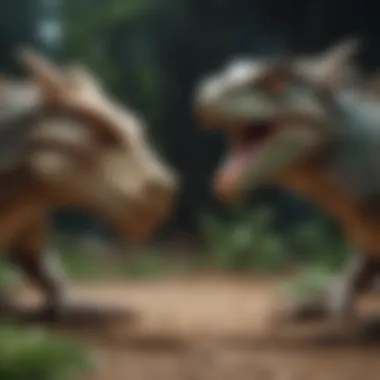
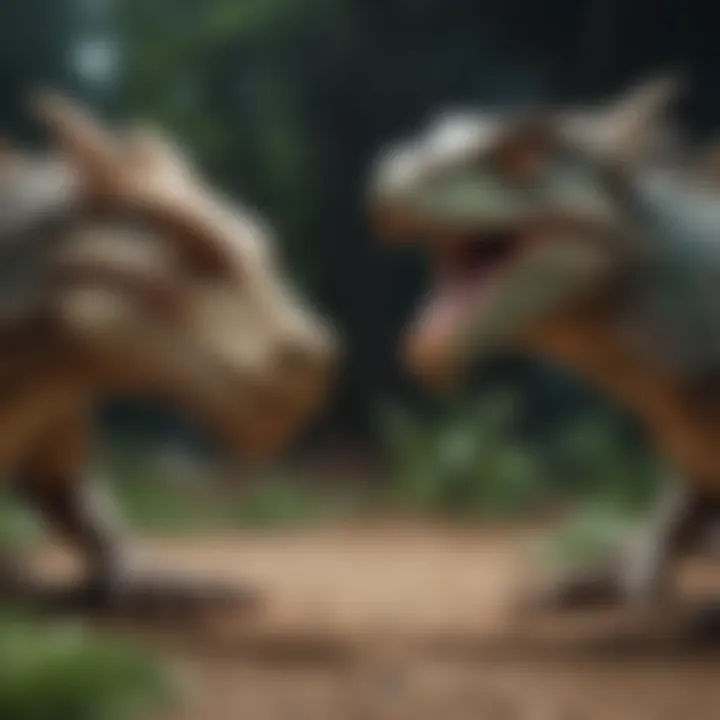
When we talk about non-traditional pets, it's easy to get swept up in discussions of reptiles, insects, or exotic birds. Yet, adding dragons into the mix pushes the boundaries even further. These legendary beings, often described as being larger than life, provide an opportunity to re-examine the concept of companionship.
Owning a pet dragon is not about simply having another creature to care for; it’s an invitation to think differently about what it means to be a guardian. One could adopt the perspective that pet jazz dragons—those who, while primarily fictional, could potentially be created using technology or virtual reality—offer profound learning experiences about responsibility, creativity, and kinship with nature.
Consider the perks:
- Enhanced Creativity: The imaginative process involved in envisaging your dragon’s habits, habitat, and personality encourages a burst in creativity, a refreshing change from routine pet care.
- Cultural Connection: Embracing mythical pets links us to rich traditions and stories, allowing an analytical look into our heritage and beliefs.
- Unique Community Engagement: The unconventionality of owning a dragon may foster a unique network, tapping into forums and social media platforms (like reddit.com and facebook.com) where enthusiasts share experiences, ideas, and art inspired by their dragon companions.
The Allure of the Uncommon
The appeal of the uncommon is rooted in our desire for the extraordinary. Most people find comfort in the familiar; yet, there's a certain thrill in the unfamiliar. In the case of dragons, their mystique captures both our curiosity and fascination. They symbolize power and grace, presenting an allure that is hard to resist. Each dragon possesses its own mythos, intertwined with deep historical narratives that can leave one spellbound.
Owning a creature like a dragon, even virtually, can also act as an antidote to life’s banality. The mere idea of nurturing such a fantastical being invites us to contemplate possibilities beyond our daily grind.
Moreover, the ownership of a fictitious dragon may compel one to reflect deeper on themes such as:
- Identity: How would you represent yourself through your dragon? Would it be fierce and unyielding, or gentle and wise?
- Environment: Designing a habitat for a dragon raises consciousness about ecological conservation and the importance of sustaining our actual environment.
- Community: The fantasy aspect often brings together like-minded individuals who can share insights and create a supportive network.
In summary, embracing the unconventional act of owning a pet dragon serves not merely as a quirky sentiment but aligns with cultural richness, personal growth, and an exploration of identity. By taking this leap into the extraordinary, we enrich our lives with narratives that can be as real and meaningful as any traditional pet ownership experience.
Understanding the Bond Between Humans and Dragons
The bond that one can forge with a mythical creature, like a dragon, often eludes direct comparison to conventional pet ownership. This connection runs deep, intertwined with the threads of imagination and cultural history. Exploring this bond provides fascinating insights into how humans project their emotions, aspirations, and values onto creatures that roam the realms of fantasy.
Emotional connections play a pivotal role in shaping these perceptions. The idea of having a dragon as a companion goes beyond mere ownership; it reflects a longing for adventure and a sense of belonging with something grander than life itself. Dragons, often depicted as wise and powerful beings, resonate with qualities that people admire. For instance, a pet dragon isn't just a creature; it signifies independence and bravery, characteristics that many individuals wish to embody.
Emotional Connections with Mythical Beings
When we think of dragons, images of ferocity and allure come to mind. Much like a childhood teddy bear, a dragon can represent comfort during times of trouble. The emotional attachment one develops is steeped in nostalgia, childhood stories, and a hunger for escapism. Dragons become vehicles for storytelling—an escape from the mundane realities of life.
As we delve deeper into this emotional repertoire, we notice that these mythical beings often function as mirrors reflecting our inner emotions. A person might connect with a fiery dragon during moments of anger or possessiveness, while a serene dragon may represent tranquility and peace. This duality allows dragons to be personalized companions with whom one's feelings can resonate.
"My dragon is my anchor in tumultuous times; it reminds me that even the fiercest can find calm within."
— Anonymous Dragon Enthusiast
Psychological Impacts of Fantastical Companionship
The psychological dimensions of owning a pet dragon are equally compelling. Numerous studies suggest that companion animals can positively influence mental health, creating comfort and joy in our lives. Although dragons exist in the realm of fantasy, they offer imaginative forms of companionship that impact psychologically.
Many individuals find solace in interacting with their imagined dragons. They serve as confidants—silent listeners to anxieties and fears that trouble the human spirit. The practice of personifying these creatures helps in exploring one’s thoughts. It’s akin to the age-old concept of talking to oneself, but through the lens of a fantastical creature.
In essence, having a dragon companion can facilitate coping mechanisms, allowing individuals to confront their emotions in a safe, imaginative space. This form of companionship encourages safety in vulnerability, affirming that it’s okay to feel fear or joy without judgment.
Moreover, the act of caring for a dragon—think of feeding it a virtual meal or designing its lair—can instill responsibility and creativity. Engaging with such a creature may forge resilience and resourcefulness among its companions.
Practical Considerations of Keeping a Pet Dragon
Understanding the practical aspects of pet dragon ownership can make the fantasy feel a little more tangible and, perhaps, a bit less whimsical. For many enthusiasts, imagining a dragon as a pet ignites not only nostalgia but also brings to light fascinating ideas about responsibility and care for these mythical creatures. Much like traditional pets, the allure of owning a dragon comes with a unique set of challenges and considerations, from habitat requirements to training techniques.
Habitat Requirements: Imaginary and Realistic
When entertaining the idea of keeping a dragon, one of the first things to consider is habitat. The very nature of a dragon evokes images of grand caves or lush mountainous terrains but, in reality, we can’t simply convert the spare room into a dragon lair filled with riches and fire.
- Space: Larger breeds, like the powerful wyvern, might need plenty of room to stretch their wings and wander. Keeping this in mind is crucial—ensuring that your dragon has a comfortable living space is essential. You might want to think about how your home’s square footage can accommodate such a magnificent creature.
- Temperature Control: Dragons may be hot-blooded, which means they’ll need a warm environment. Depending on the breed, you could likely invest in temperature-regulating systems, making your home cozy for your dragon buddy. This could be anything from specialized heating lamps to a system that mimics volcanic warmth, minus the dangers, of course.
- Safety: Much like securing a cat indoors, safety should be a priority for your dragon’s habitat. Ensuring that windows and doors are secure will prevent any unexpected escapes—after all, you wouldn’t want your dragon flying over the neighbors’ roof!
A good blend of creativity and practicality will help bring their habitat to life, that’s for sure.
Nutrition and Care for Your Dragon
Next up, each dragon has its unique dietary needs, which might resemble the feeding of more traditional pets—perhaps a blend of meat, veggies, and some exotic delicacies that would make even a chef blush. Here’s what to consider:
- Diet Diversity: Dragons may require a mixed diet; herbivorous dragons could delight in fresh greens and magical herbs, while carnivorous types may want their fair share of exotic meats. Naturally, any fancy foods need to be fairly safe and free of toxins.
- Feeding Schedule: Like feeding schedules of more earthly pets, dragons need routine. Consistency is key; try to feed your dragon at the same time each day. Plus, certain dragons might like a little snack now and then—don’t be surprised if they want their rations just before bed!
- Water Intake: Keeping your dragon hydrated is a must! While they might not drink as often as your average cat or dog, providing fresh, clean water is important, especially after a hearty meal. Consider using a self-refilling water bowl to ease the burden.
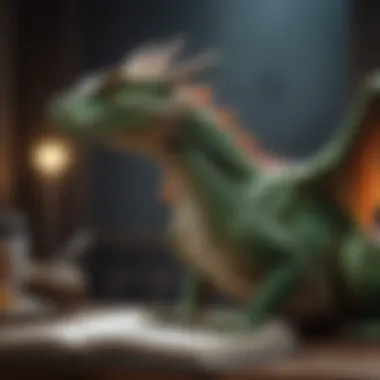
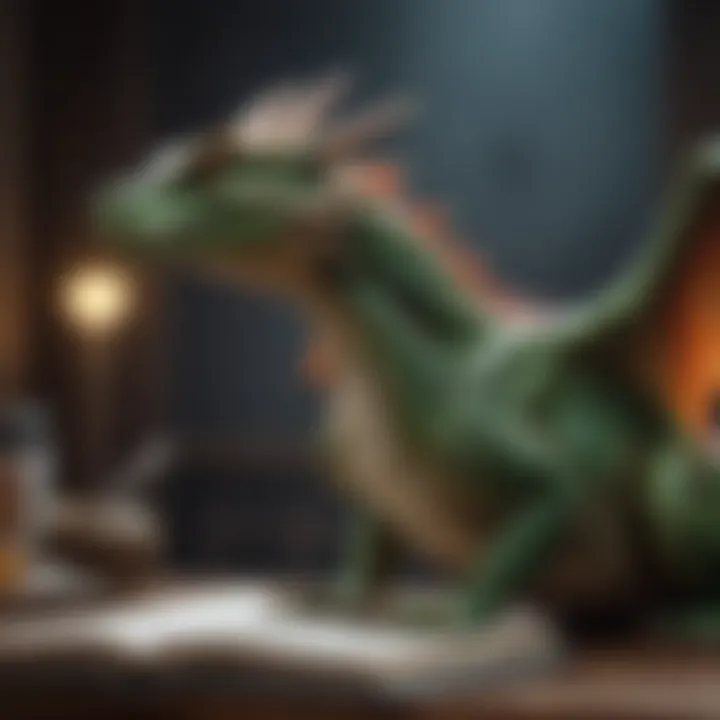
Nurturing your dragon’s dietary habits will not only keep it healthy but, frankly, it could help avoid fire-breathing tantrums!
Training Techniques for Mythical Creatures
Trainin your dragon is perhaps the most challenging yet exciting part of owning one. While dragons are often portrayed as fierce and untameable beasts, they can be trained much like dogs or even birds, but with a firmer approach and a tad more creative flair. Here’s how to start:
- Positive Reinforcement: This tactic works wonders! Use treats, which could be a tasty chunk of raw meat or a hint of magic invigorating herbs to encourage good behaviors.
- Social Interaction: Create a bond with your dragon through interaction. This could range from playful sessions to gentle napping together. Over time, your dragon will warm up to you, especially if you approach every interaction with trust and respect.
- Consistent Commands: Just like a dog responds to "sit" or "stay," dragons can learn commands too, but make sure they’re simple yet effective. Try using gestures combined with verbal instructions.
Training may need patience and understanding, but building that relationship can be rewarding in ways you might not have imagined.
"Owning a dragon is not just about having a pet; it’s a commitment, a partnership that requires care, love, and understanding of its distinct needs."
In summary, practical considerations for owning a pet dragon unfold a myriad of fascinating insights. Engaging with these unique mythical beasts isn’t just about dreamscapes; it calls for thoughtful planning and understanding to ensure harmony between the dragon and its human companion.
Ethical Implications of Dragon Ownership
The concept of owning a pet dragon, while thrilling and captivating, raises significant ethical considerations that delve deeper than just the fantasy element. As we explore the implications of dragon ownership, it becomes crucial to reflect on the responsibilities that come with having a mythical creature in one's life. The idea transcends mere possession, and instead, invites a broader discourse on animal rights, the morality of creating fantastical companions, and the emotional repercussions entwined within these bonds. Understanding these aspects is paramount, as owning a dragon—real or imagined—could inadvertently challenge our perceptions of care, respect, and the essence of companionship.
Animal Rights Perspectives in Fantasy
When discussing dragon ownership, one cannot ignore the intricate web of animal rights as it pertains to fictional creatures. Much like discussions surrounding traditional pet ownership, the ethical treatment of dragons invites consideration of their inherent rights. Dragons, in the realm of fantasy, often embody traits that reflect deep emotional intelligence, loyalty, and sentience. As such, advocates for animal rights might argue that treating these beings as mere decorative objects or symbols of status undermines their potential as beings deserving of respect and compassion.
People can draw parallels between how society regards pets today and how dragons might be perceived in a future where they exist. Concerns about confinement, exploitation, and mistreatment reflect on how we approach our relationships with animals in general. Would owning a dragon mean providing a lavish lifestyle complete with vast skies to soar through? Or does it imply sacrificing their instincts for a more conforming domestic life?
"To share your life with another creature is a profound responsibility. One must consider what that bond entails beyond the surface level of ownership."
The right to freedom, social interaction, and a natural habitat comes into focus here. Just because a creature is fantastical, it doesn’t strip away the core values of humane treatment. Owners of imaginary pet dragons would need to cultivate an awareness that respects the essence of these beings, reflecting on what constitutes ethical ownership.
The Morality of Creating Mythical Companions
Creating mythical companions such as dragons evokes profound questions about morality. At the heart of this exploration lies a tension between the joy of companionship and the potential consequences of creating beings derived from our fantasies. It opens up dialogue about whether humans should possess the power to forge life forms, even if they are imaginary. The act of making a dragon companion can be seen as a fulfillment of human desire for connection, yet it solidifies our human-centric worldview, oscillating between creation and control.
Moreover, the morality in question extends to anthropomorphism—the tendency to imbue dragons with human traits, feelings, and emotions. This exercise in imagination might enrich stories and art but at what cost? When we project human emotions onto these creatures, we risk diminishing their unique existence as beings with their own characteristics. The responsibility then lies with us to not only recognize the imaginary implications of dragon ownership but also tread lightly through the ethereal landscape of morality inherent in such fantasies.
The Future of Pet Dragons in Society
Looking forward, the future of pet dragons provides us with a canvas painted with potential hues of technology, culture, and imagination. While dragons may dwell in the realms of the mythical, their representation in society is far from imaginary. It could reshape perceptions of companionship and responsibility as we transcend traditional pet ownership boundaries into a very different territory.
Technological Innovations and Virtual Dragons
In a world where our screens often consume our attention, technology has started to breathe life into the concept of owning a dragon. Nowadays, advancements in virtual and augmented reality introduce ways to interact with these magnificent creatures without the tangible constraints of real-life dragons. Imagine donning a pair of augmented reality glasses, and poof!, a vibrant dragon appears in your living room, flapping its wings and breathing digital fire.
This technology allows for a deeper immersion into the fantasy of pet dragons. In virtual platforms, one might train, care for, and interact with a dragon as if it were the real deal. For instance, applications like Dragon City have already whetted users' appetites for dragon companionship through breeding and battle simulations. The gamification aspect works wonders in engaging enthusiasts and promoting an emotional bond that might mirror real-life interactions.
Moreover, considerations of technology in educating prospective owners are vast. With engaging content available online, individuals can learn the ins and outs of dragon care—habitat requirements, diet, and training techniques—all through interactive experiences that blur the lines between fact and fiction.
Cultural Shifts in Perception of Mythical Pets
As society evolves, so do our concepts of companionship. This shift in perspective may lead many to consider mythical creatures as legitimate pets. In the last few decades, we have seen a burgeoning fascination with
Closure: Reflecting on the Fascination with Pet Dragons
Exploring the concept of pet dragons reveals not just a fleeting trend, but a profound longing for connection with the mythical. Each discussion, whether about historical perspectives or modern representations, circles back to human nature's eternal desire for companionship that transcends the ordinary. Pet dragons encapsulate a unique juxtaposition between reality and fantasy, merging our thirst for adventure with deep-rooted cultural tales.
Synthesis of Insights Gained
Throughout this narrative, various threads have woven a cohesive understanding of pet dragons.
- Cultural Significance: From ancient civilizations to contemporary narratives, dragons have symbolized more than just terror or destruction; they embody wisdom, strength, and loyalty.
- Emotional Bonds: The emotional connection we hold towards these creatures illustrates a yearning for belonging and the escape from quotidian life. Imagining a world where dragons exist as pets lets us navigate our feelings of isolation and injects wonder into our lives.
- Practical Considerations: While the whimsical thought of pet dragons delights the imagination, practical considerations, including habitat requirements and nutrition needs, ground the discussion. This interplay between dream and reality highlights the responsibility inherent in any form of pet ownership, even if that pet is purely fantastical.
In summation, our fascination with pet dragons serves as a mirror reflecting our own desires, fears, and dreams; it encapsulates the interplay between joy and responsibility.
Implications for Future Generations
The implications of nurturing this fascination extend far beyond mere fantasy. As generations evolve, the conversation around pet dragons can mold perspectives on everyday companionship.
- Encouragement of Creativity: Children, sparked by tales of mythical creatures, may grow into adults who champion creativity in problem-solving, fostering innovation in their fields. Thus, embracing pet dragons can inspire imaginative thinking, which is crucial in an increasingly automated world.
- Broader Understanding of Companionship: As our society progresses, recognizing the emotional landscape associated with mythical pets can influence real-world pet ownership norms. The exploration of deeper connections can lead to more empathetic treatments of all animals, including traditional pets.
- Ethical Considerations: Lastly, it instills in young minds the importance of ethics in companionship. Discussing the responsibilities tied to caring for a pet dragon can instigate conversations around sustainability and animal rights, equipping future generations to make informed ethical decisions.
In essence, the charming lore of pet dragons not only enriches personal lives but also holds the potential to alter societal views on companionship and responsibility. As we muse on these fantastical beings, let us remember the implications our fanciful imaginings could have on the fabric of future societies.















